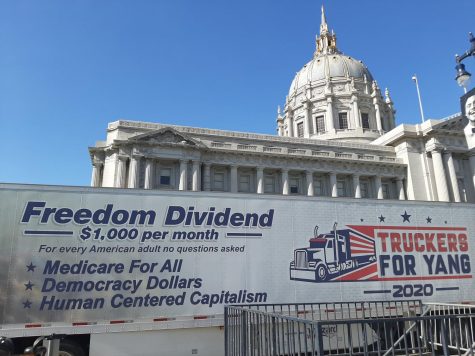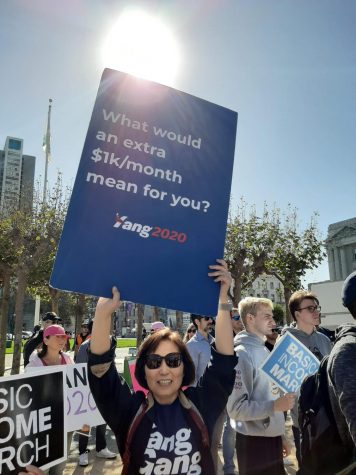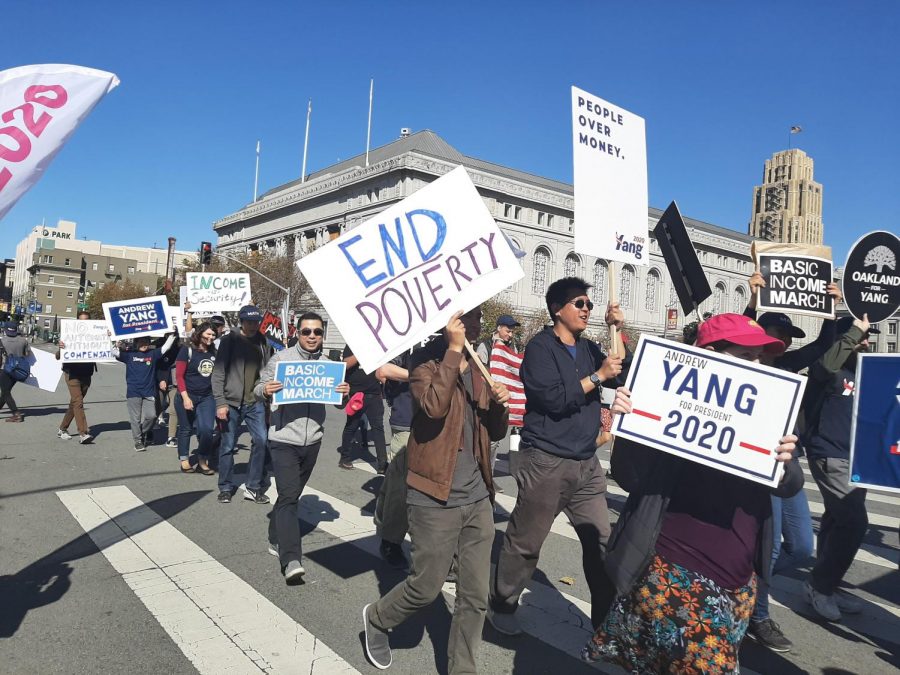Marchers demand universal basic income
December 3, 2019
Daniel Watson wasn’t interested in politics until he heard Andrew Yang speak about universal basic income. Andrew Yang is a 2020 Democratic presidential candidate who wants to give every U.S. adult $1000 a month, no strings attached.
For Watson, who works as a delivery person for Doordash, $1000 a month would make a real difference. With the extra money, he would pay off his debt, and he wouldn’t have to worry about the essentials.
At age 18, debates about health care aren’t relevant to Watson, but Yang’s ideas would actually affect him.
“He will change the most in the shortest amount of time,” Watson said.
Yang’s proposal to give $1000 a month to every U.S. adult is known as universal basic income (UBI). UBI may be implemented in a variety of ways, but each always involves the government periodically giving money to its citizens, as a reinforcement or replacement of, the current social safety net.
Yang is currently UBI’s most famous advocate, but it’s an idea that has existed for a long time.
On Oct. 27, 2019, Watson and other Yang and UBI supporters marched through the streets of San Francisco to demand universal basic income. The march ended with a rally at the Civic Center with speeches by universal basic income advocates, including Andrew Yang.
Andrew Yang has made UBI the central idea of his campaign because he believes it’s the best solution to unemployment created by automation. Yang’s campaign website says, ‘In the next 12 years, 1 out of 3 American workers are at risk of losing their jobs to new technologies.’ He proposes that UBI would provide a safety net for people while they look for a new job.

The organizers of the march think universal basic income will decrease economic inequality.
Organizers wrote in a press release, ‘Universal Basic Income is endorsed by experts, economists and Nobel Prize winners across the political spectrum as a solution to end poverty and inequality exacerbated by globalization, automation and other factors.’
Universal basic income is distributed as pure cash, so it can be used for any purpose, unlike government benefits programs like food stamps and subsidized health care, which are limited to a single purpose. For proponents of UBI, this is a major advantage, since recipients themselves are best positioned to determine the most effective use of the benefit in their specific situation.
March attendees theorize that UBI can solve a diverse set of problems.

Agatha Bacelar, one of the speakers at the march, thinks that universal basic income would strengthen our democracy by enabling people to quit their jobs and run for office.
Others see it as a safety net for domestic violence victims, allowing them to leave abusive situations with a secure income source.
Supporters also say that UBI will give artists and entrepreneurs more financial flexibility to pursue their dreams, and will provide an income for mothers and unpaid caregivers.
While supporters like that UBI can be used for any purpose, skeptics worry that recipients might use the money for the wrong purpose.
Rebecca McCall, a passerby who stopped to watch the rally, worried that people might spend the money on drugs.
“What if people choose not to spend it on health care and education?” McCall said.
Attendees of the march are optimistic about the problems UBI would solve, yet they are less sure about how much it would cost or how the country would pay for it.
March speaker Agatha Bacelar said UBI would cost trillions of dollars, but it would save money on other government programs.
“Taking care of people and making them more self-reliant is good for everyone,” Bacelar said.
Gisele Huff, a sponsor of the march, said a UBI of $1000 a month would cost close to $4 trillion a year. Her estimate is in line with many other cost estimates for a UBI.
But some say the true cost is actually much lower. For example, American economist Karl Wunderquist gives a rough estimate of $539 billion a year.
These estimates differ because they use different calculation methods. The simplest method is to just multiply the amount of money received per year by the number of people receiving it.
Wunderquist says that this calculation method is inaccurate.
He his paper, The Cost of Basic Income: Back-of-the-Envelope Calculations, Wunderquist writes, ‘UBI involves a very large amount of taking money from and giving it back to the same people at the same time in the same form.’
Unlike other government benefit programs in which taxpayers pay for benefits that go exclusively to low income people, UBI is universal. That means that many taxpayers will be paying for their own UBI.
This concept is illustrated simply in Universal basic income costs far less than you think, by Oxford academic Elizaveta Fouksman.
She writes, ‘Imagine a room with 15 people who want to set up a UBI for the room of $2 per person. The upfront cost of the policy would be $30. The ten richest people in the room are asked to contribute $3 each towards funding it.’
She continues with, ‘After they each put in $3, raising the total $30 needed, every person in the room gets their $2 universal basic income. But because the ten richest people in the room contributed $3, and then got $2 back as the UBI, their real, net contribution is in fact $1 each. So the real cost of the UBI is $10.’
In the system that Fouksman describes, the UBI for the 10 rich people is simply a tax credit deducted from their total taxes owed. The rich individual owes $3 in taxes, but a $2 UBI is deducted, so they only pay $1 in taxes. In theory, the rich people in this system are paying for their own UBI, but in practice the UBI is only a deduction from their taxes at the end of the year.
Looked at this way, the burden to taxpayers appears much lower. However, one also starts to realize that UBI is not quite as alluringly simple as it may seem. It doesn’t just mean that every American will be $1000 richer each month.
You can consider universal basic income as a way to structure taxes so that no one is left with nothing. Even people without any other income will get $12,000 per year.
But that money has to come from someone. UBI is not universal because everyone receives a net benefit from it, but rather because it establishes a universal baseline – no one’s income can drop below that amount.
With an Andrew Yang win, the U.S. would be the first country to implement UBI on a nationwide basis. Yang is unlikely to win, but that doesn’t mean the basic income movement will die.
UBI has other supporters besides Andrew Yang.
Gisele Huff said that there are around 20 candidates for Congress who support a UBI. Huff herself will continue to spread awareness about the benefits of universal basic income because she believes it’s the best approach to deal with modern issues.
Huff said, “We need to grapple with 21st century problems with 21st century solutions.”






















































































